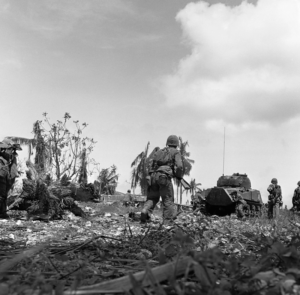The court also ruled that the Syrian regime committed war crimes.
It was an important case, but, legal experts warned before the first witness testified that it would not be easy to get a conviction.
The warning turned out to be correct.
The highest ranking former Syrian officer, Brigadier General Mohammed Hamo was accused of ‘aiding and abetting” war crimes in 2012. A court in Stockholm, Sweden acquitted him on Thursday.
There have been convictions in European courts for Syrian officials charged with torture and targeting Syrian civilians with chemical weapons – but what made this case different – the charge was about warfare – how the Syrian regime conducted a war after a popular uprising in 2011 that displaced more than a million people. The death toll is estimated a half a million.
The Chief prosecutor Karolina Wieslander said that it had been “a tough case to investigate,” considering the country was still at war, which made it “hard to gather evidence.” She added that one positive outcome of the ruling, “A court of law ruled that what the Syria government did was war crimes,” in an interview with the Associated Press.
The Swedish district court said the prosecution did not prove that Hamo had personally played in role in providing weapons for the attack.
Hamo found himself in the middle of the conflict in 2012 as the Syrian army stepped up a brutal crackdown on peaceful protestors to break the revolt in the restive town of Homs. He headed the armaments department of the 11th division of the Syrian army that relentlessly targeted civilians as well as American journalist Marie Colvin and photojournalist Remi Ochlik, killed by direct shelling aimed at a makeshift media center on February 22, 2012.
AN ASYLUM CASE IN SWEDEN
By June of that year, Hamo had switched sides after he was transferred to northern Syria. He escaped across the Turkish border and joined a group of rebels fighting against the regime. Finally, he joined the surge of Syrians fleeing the war, arriving in Sweden in 2015 where he was granted asylum. But in his intake interview, he revealed his former role in the Syrian military and his case was referred to Sweden’s war crimes investigation unit. He was charged a decade later. The 8 plaintiffs who brought the case are considering appealing Hamo’s acquittal.
European courts have been particularly active in Syrian war crime cases after Russian and China frustrated a legal response at the United Nations Security Council when a coalition of States tried to refer a case to the International Criminal Court.
The first conviction came in a German court in January 2022, when the Higher Regional Court in Koblenz convicted the main defendant, former Colonel Anwar Raslan of crimes against humanity. The pace quickened as more cases moved forward in Sweden, Austria, Switzerland, The Netherlands, and France.
The road to accountability is a long game. It can take years to investigate and build a case. European courts employ universal jurisdiction, a legal principal that allows states to claim jurisdiction for grievous crimes regardless of where the crime was committed, or the accused nationality.
But as successful as these prosecutions have been, the convictions also demonstrate the limits of accountability. The war in Syria is not over. No senior Syrian official has been arrested or jailed. Torture continues in Syria’s notorious prison system.
However, the victims have had their day in court. They have recorded their accounts for an official record. The war in Syria was also a war of words – where narratives clashed in a brutal manner. The witnesses get the last word, and they say that has value.




